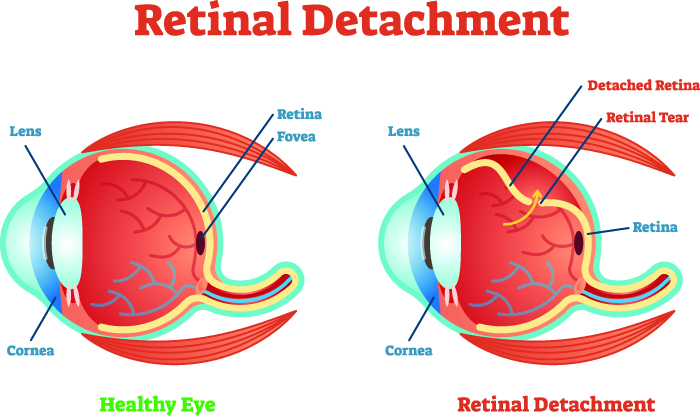Diabetic Retinopathy Treatment in Tardeo, Mumbai
Diabetic retinopathy is an eye disorder resulting from untreated or poorly managed diabetes. Increased blood sugar levels cause damage to the retinal blood vessels, leading to a myriad of symptoms.
Diabetic retinopathy is a progressive, irreversible disease. So, an early diagnosis and regular eye examinations by a healthcare expert can help slow down the progress of the disease. It is one of the most prevalent ophthalmic(eye) disorders in diabetic individuals.

What Is Diabetic Retinopathy?
Diabetic retinopathy occurs in diabetic individuals as a result of damage to the retinal blood vessels. It can occur in individuals with type1 or type 2 diabetes. The retina is the posterior part of the eye that converts light into electrical impulses, giving you your vision(sight). Uncontrolled blood sugar levels for prolonged periods can lead to mild symptoms of vision loss, progressing to even loss of sight.
What Are the Symptoms of Diabetic Retinopathy?
Some of the signs and symptoms of Diabetic Retinopathy are as follows:
- Redness or eye pain
- Patchy or distorted vision
- Color blindness
- Small spots within your vision (floaters)
- Night blindness (poor night vision)
- Difficulty in reading or seeing objects at a distance
- Sudden vision loss
What Causes Diabetic Retinopathy?
Prolonged elevated blood sugar (glucose) levels lead to weakening and damage of the retinal blood vessels. This can lead to bleeding, pus formation, and swelling of the retina, which leads to decreased supply of oxygen to these blood vessels and the retina. As a result, the retina is starved of oxygen, leading to the growth of abnormal blood vessels, causing diabetic retinopathy.
When Should You Consult a Doctor?
If your glucose levels consistently remain high despite treatment, or if you notice any vision changes, it is essential to consult your doctor. If you have diabetes, book an appointment with an ophthalmologist annually or as recommended by your doctor.
You can also search for ‘ophthalmology doctors near me’ or ‘ophthalmology hospitals near me’ on Google and book an appointment with expert healthcare providers.
Request an appointment at Apollo Spectra Hospitals, Tardeo, Mumbai.
Call 1860 500 2244 to book an appointment.
How Is Diabetic Retinopathy Diagnosed?
To diagnose diabetic retinopathy, your ophthalmologist will perform the following tests:
- Visual acuity: To identify how accurate your sight is
- Eye muscle function: This will help your doctor evaluate your ease and ability to move your eyes.
- Peripheral vision: Your ophthalmologist will observe how well you can see from the sides of your eyes.
- Ruling out glaucoma: Checking intraocular pressure (pressure within your eye).
- Pupil response: The ophthalmologist will check how well your pupils respond to light.
- Pupil dilation: For a more in-depth examination, your ophthalmologist will check for signs of bleeding, growth of any new blood vessels, or any retinal swelling after dilating(widening) your pupils (center of the eye)
How Is Diabetic Retinopathy Treated?
Your doctor will decide your treatment based on your age, medical history, visual acuity, blood sugar control, and extent of retinal damage. However, for advanced stages or where screening identifies risk to your vision, diabetic retinopathy can be treated by the following methods.
- Laser treatment: Lasers help shrink blood vessels and reduce retinal swelling.
- Eye injections: Medicines to prevent the disease’s progression and improve your vision are injected into your eye.
- Eye surgery: Outpatient surgery may be performed to eliminate excess scar tissue or blood from the eye in case of failure of laser treatment or advanced retinopathy.
Conclusion
Diabetic retinopathy, if identified early, can be treated to avoid the loss of your vision. However, despite treatment, it is still essential to control your blood sugar to prevent further complications. Regular screening, as advised by your doctor, is critical to monitor any deterioration. If you live in Tardeo, you can look for ophthalmology hospitals in Tardeo for further assistance.
Uncontrolled blood sugar levels, hypertension (increased blood pressure), smoking, pregnancy, hyperlipidemia (increased cholesterol levels), and the duration of your diabetic condition may pose a severe risk of diabetic retinopathy.
Bleeding within the eye (vitreous hemorrhage), pulling away of the retina from the back of the eye (retinal detachment), pressure build-up in the eye (glaucoma), and blindness are some of the long-lasting effects of diabetic retinopathy.
Here’s how you can prevent diabetic retinopathy:
- Control your blood sugar and cholesterol levels
- Avoid smoking
- Exercise regularly
- Maintain optimal blood pressure
- Have your medicines regularly
- Get annual eye examinations done
- Promptly seek medical advice in case of any vision changes
If you think you have some of the symptoms, you can look for ophthalmology doctors in Tardeo to discuss some preventive measures.
You can also request an appointment at Apollo Hospitals, Tardeo, Mumbai.
Symptoms
Our Doctors
DR. NEETA SHARMA
MBBS, DO (Ophthal), ...
| Experience | : | 31 Yeras Experience |
|---|---|---|
| Speciality | : | Ophthalmology... | Location | : | Chembur |
| Timings | : | Thur, Fri : 10:00 AM... |
DR. PALLAVI BIPTE
MBBS, MS (Ophthalmol...
| Experience | : | 21 Yeras Experience |
|---|---|---|
| Speciality | : | Ophthalmology... | Location | : | Chembur |
| Timings | : | Mon - Wed, Fri & Sat... |
DR. NUSRAT BUKHARI
MBBS, DOMS, Fellowsh...
| Experience | : | 12 Yeras Experience |
|---|---|---|
| Speciality | : | Ophthalmology... | Location | : | Tardeo |
| Timings | : | Mon - Fri : 9:00 AM ... |
Our Top Specialities
NOTICE BOARD
CONTACT US
CONTACT US
 Book Appointment
Book Appointment





.svg)
.svg)
.svg)
.svg)








